Key takeaways:
- Discipline in parenting is about teaching boundaries and consequences rather than control; fostering open dialogue helps children understand the reasons behind rules.
- Consistent discipline creates clear expectations and fosters trust, helping children develop self-regulation and accountability.
- Effective discipline techniques include using natural consequences, positive reinforcement, and involving children in decision-making to build ownership and responsibility.
- Adapting discipline techniques to a child’s age ensures effectiveness, with strategies evolving from visual aids for toddlers to collaborative discussions with teens.

Understanding discipline in parenting
Discipline in parenting often gets a bad rap, but I believe it’s really about teaching children boundaries and consequences. I remember the first time my child pushed limits—they tested my patience! Instead of reacting with anger, I sat down with them to discuss why those boundaries exist, creating a living lesson rather than a punitive moment.
As parents, we grapple with questions like, “What’s the right balance between structure and freedom?” I find that sharing my experiences with my child fosters understanding. When I draw from my own childhood struggles with discipline, it becomes a meaningful conversation rather than just a corrective lecture, helping my child see the “why” behind the rules.
It’s easy to fall into the trap of using discipline solely for control, but I choose a different path. I found that nurturing an open dialogue about behavior enables my child to express emotions instead of just reacting. This shift has transformed our interactions; I often wonder if other parents experience similar revelations when they move from strict discipline to a more empathetic approach.
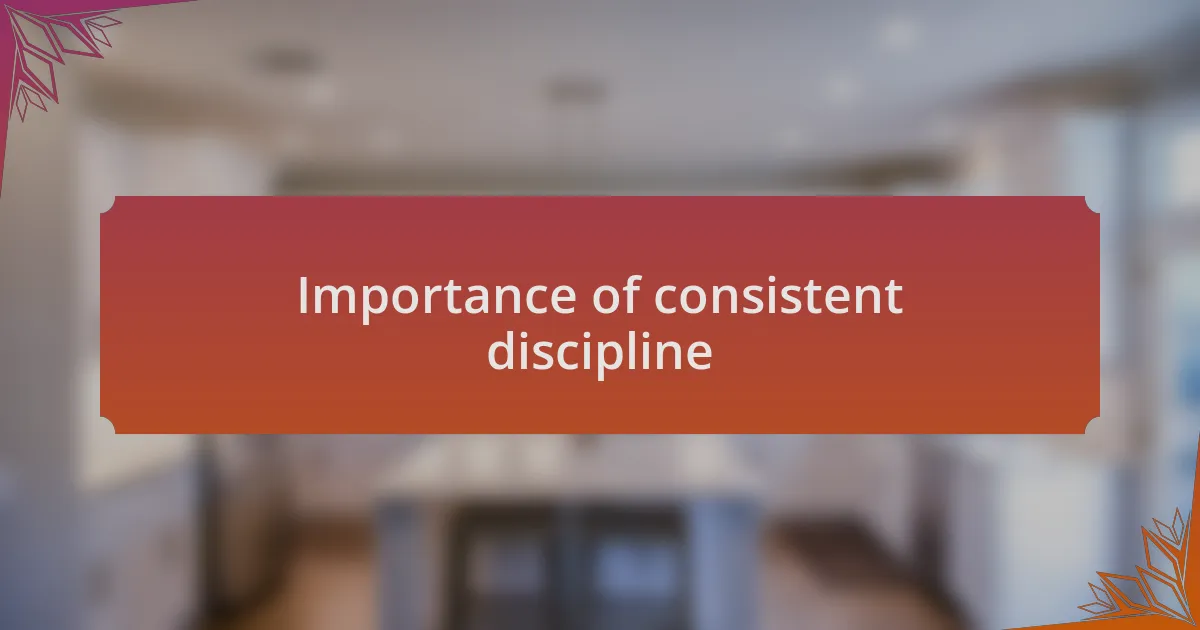
Importance of consistent discipline
Consistent discipline is crucial because it sets clear expectations for children. I vividly remember a time when I wavered in my approach, alternately enforcing rules and letting things slide. It created confusion for my child, who seemed uncertain about what behaviors were acceptable. That experience opened my eyes to how essential stability in discipline truly is; without it, children may struggle to navigate their social interactions and personal decisions.
When I think about the long-term impact of consistent discipline, I can’t help but reflect on how it lays the groundwork for responsibility. For instance, after consistently enforcing a no-screen time rule during homework, I noticed my child developed healthier study habits. This transformation didn’t happen overnight, but the regular reinforcement made it clear: discipline is not merely about immediate correction; it’s about cultivating self-regulation and accountability which, as a parent, I find incredibly rewarding.
Moreover, I often wonder how many parents recognize that consistent discipline fosters trust. When my child knows that I will respond similarly to both good and bad behavior, they feel secure enough to come to me with their mistakes. I think this growth in trust deepens our bond; it’s more than just rules—it’s about building a relationship based on understanding and reliability. How beautiful is it to witness that connection flourish?
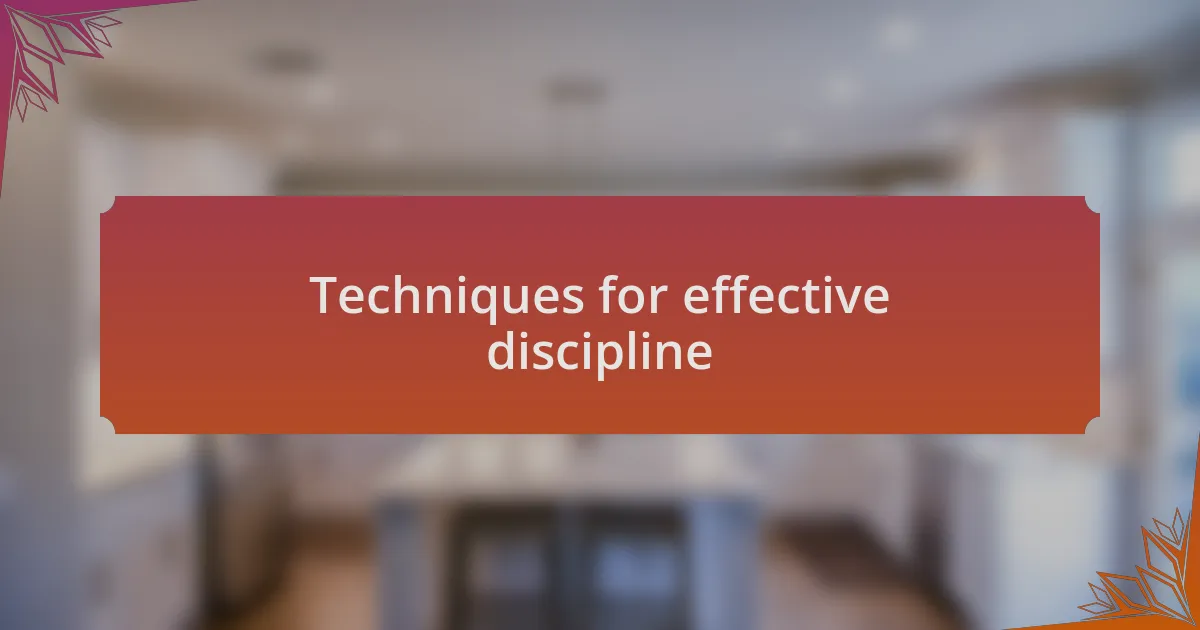
Techniques for effective discipline
One technique I’ve found particularly effective in maintaining discipline is the use of natural consequences. When my child ignored their chores, I resisted the urge to step in and fix the situation. Instead, I allowed them to experience a missed playdate as a result. While it was tough to watch, that experience sparked a genuine conversation about responsibility and the importance of following through on commitments. Have you ever noticed how real-life lessons often carry more weight than directives?
I also believe in the power of positive reinforcement. When my child achieved a significant milestone, like completing a big project without being reminded, I made a point to celebrate their hard work. Using praise in that moment not only motivated them to excel further, but it created a deeper appreciation for their efforts as well. Isn’t it fascinating how recognizing positive behavior can lead to a cycle of encouragement?
Another approach I value is having structured discussions about consequences ahead of time. I remember sitting down with my child to talk through potential outcomes for certain behaviors. This proactive strategy gave them ownership over their actions and made it easier to follow agreed-upon rules. Reflecting back, I can see how this dialogue shifted our dynamic; it wasn’t just about enforcing rules anymore, but rather collaborating on decisions that ultimately built a sense of accountability together.
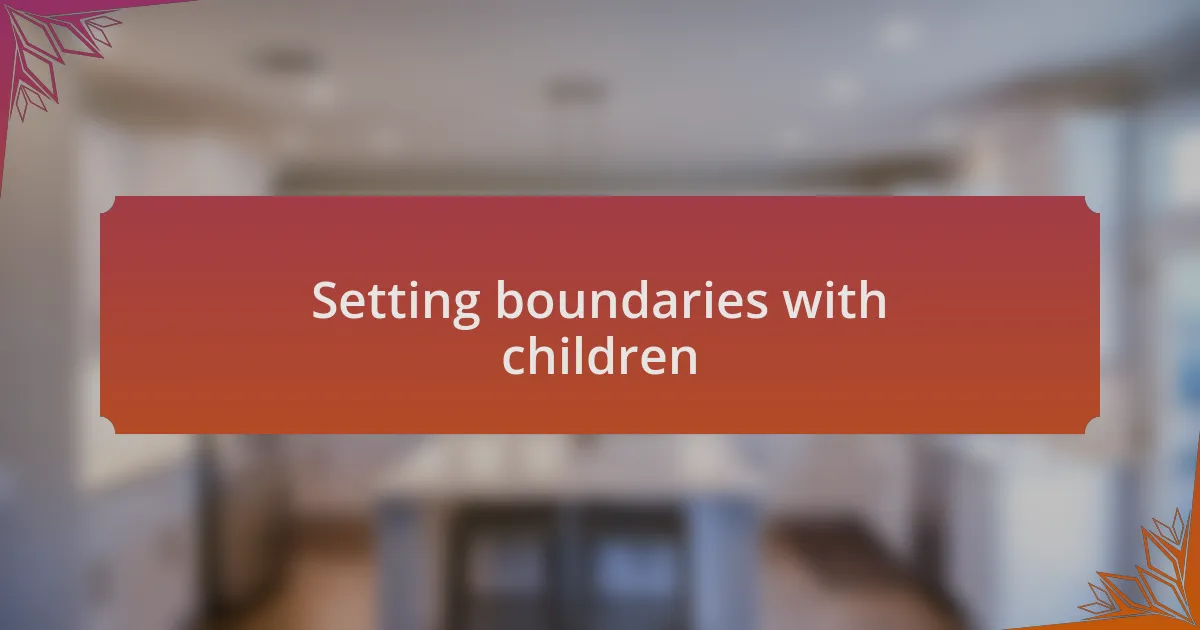
Setting boundaries with children
Setting boundaries with children requires a thoughtful approach that prioritizes consistency and clarity. I remember the first time I outlined specific screen time limits with my child; it felt like a daunting task at first. However, once I established those boundaries, not only did I notice a reduction in arguments about device usage, but it also created a sense of security for my child, knowing what to expect. Isn’t it interesting how clear guidelines can foster a more harmonious environment?
In my experience, it’s essential to communicate the reasons behind boundaries. For instance, when I explained why we needed to limit dessert, I didn’t just say no; I talked about health, energy levels, and feeling good overall. This made my child much more receptive to the rules, and I often saw them weigh their choices more thoughtfully. Have you ever noticed how meaningful explanations can help kids internalize expectations?
Another effective technique I’ve tried is involving my child in the boundary-setting process. When they were old enough, I invited them to help decide on bedtime. By giving them input, not only did they feel heard, but they also became more invested in respecting the chosen time. That partnership not only strengthened our bond but also made the transition into sleep much smoother. Isn’t it rewarding when children take ownership of their actions and decisions?
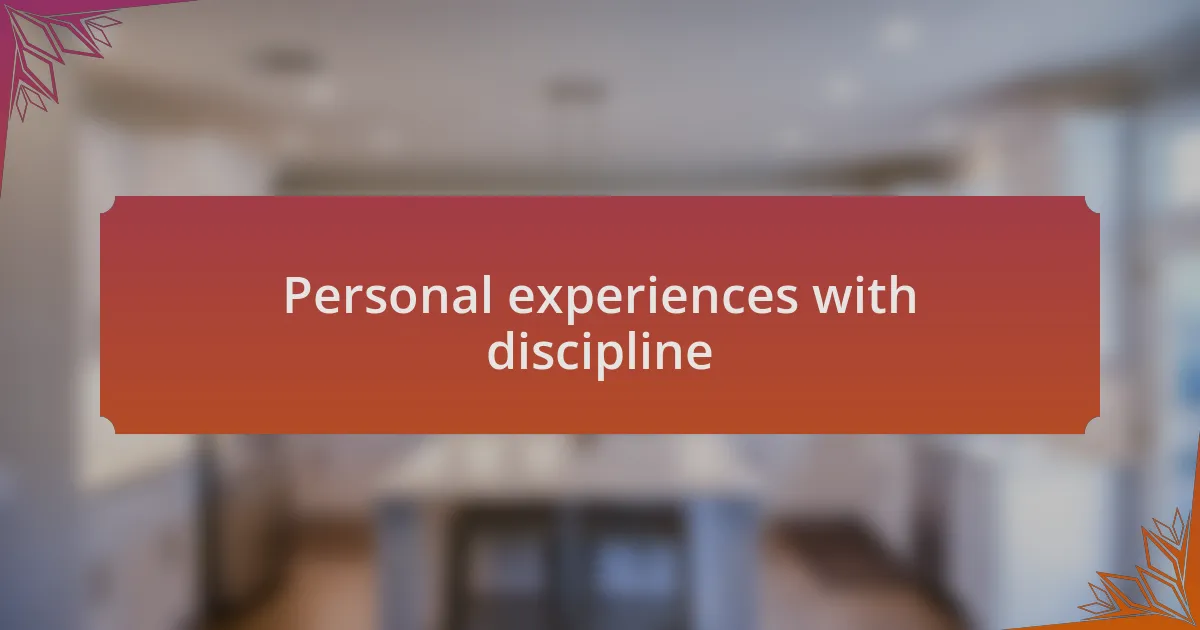
Personal experiences with discipline
I’ve found that maintaining cool moments can significantly impact discipline. One evening, during a particularly chaotic dinner, my child spilled their juice everywhere. Instead of reacting in frustration, I took a deep breath and addressed the situation calmly. It surprised me how my calmness transformed the atmosphere; we ended up laughing about it, and my child learned that mistakes happen. Have you ever noticed how your reaction can shape a child’s understanding of consequences?
Another tactic that has worked wonders for me is the use of natural consequences. Once, my son forgot to bring his favorite toy to a family gathering. While it pained me to see him sad, I believed it was crucial for him to experience that disappointment. The next time we left the house, he was meticulous about packing his belongings. I often wonder if these small moments of discomfort help children develop a sense of responsibility.
I’m a firm believer in the power of positive reinforcement. I remember when my daughter was eager to learn how to ride her bike. Rather than focusing on her falls, I celebrated every tiny success she had. The moment she finally balanced herself and rode off, the pure joy on her face was priceless. I think it’s fascinating how recognizing achievements, no matter how small, can build a child’s confidence and motivate them to keep trying. What strategies have you found inspiring in your own parenting journey?
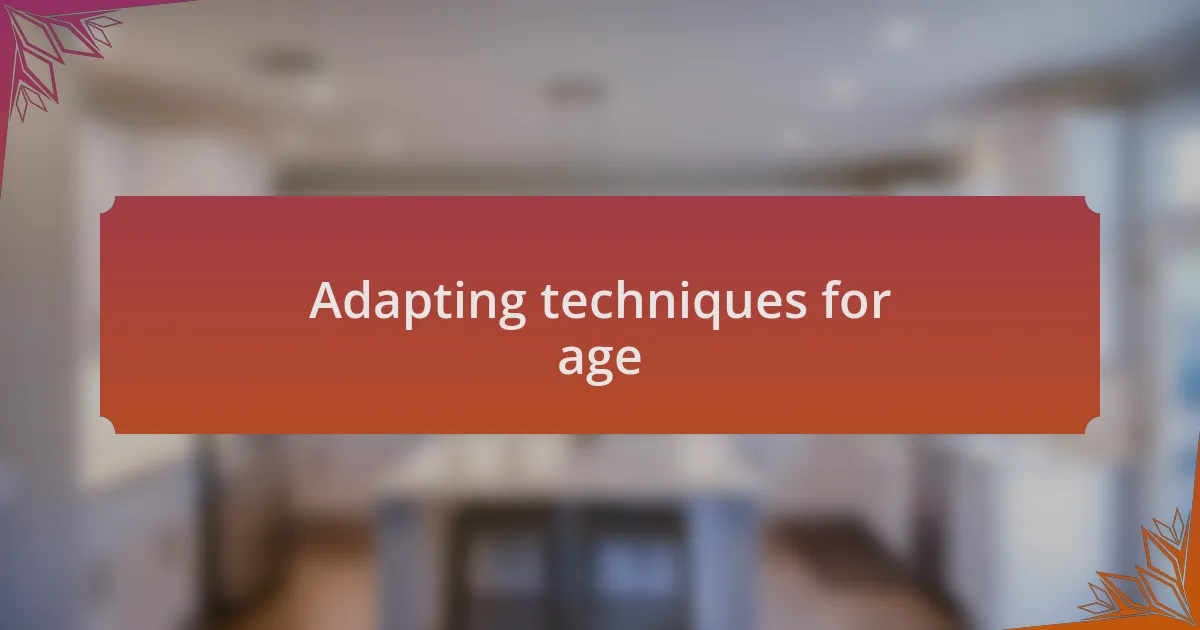
Adapting techniques for age
When adapting discipline techniques for different ages, I’ve realized that toddlers respond well to visual cues. For instance, I introduced a colorful chart to help my youngest understand daily routines and expectations. This small change not only made learning fun but also allowed him to take ownership of his progress, fostering a sense of independence. Have you found visual aids effective in your parenting journey?
As my children entered the school years, I shifted toward more discussion-oriented techniques. I remember a time when my daughter was struggling with sharing her belongings. Instead of dictating rules, we had a family conversation where each of us shared feelings about sharing. This approach not only deepened our understanding but also empowered her to empathize with her siblings. Have you ever noticed how open dialogue can transform behavior and strengthen family bonds?
With teenagers, I’ve learned that giving them responsibilities fosters a sense of maturity in discipline. For example, when my son began staying out later with friends, I encouraged him to propose a curfew. I remember the first time he came back on time; I could see the pride in his eyes, knowing he had set and met his own limit. I find it fascinating how mutual respect and trust can evolve during these critical years. What experiences have you had with negotiating boundaries that resonate with your teen?
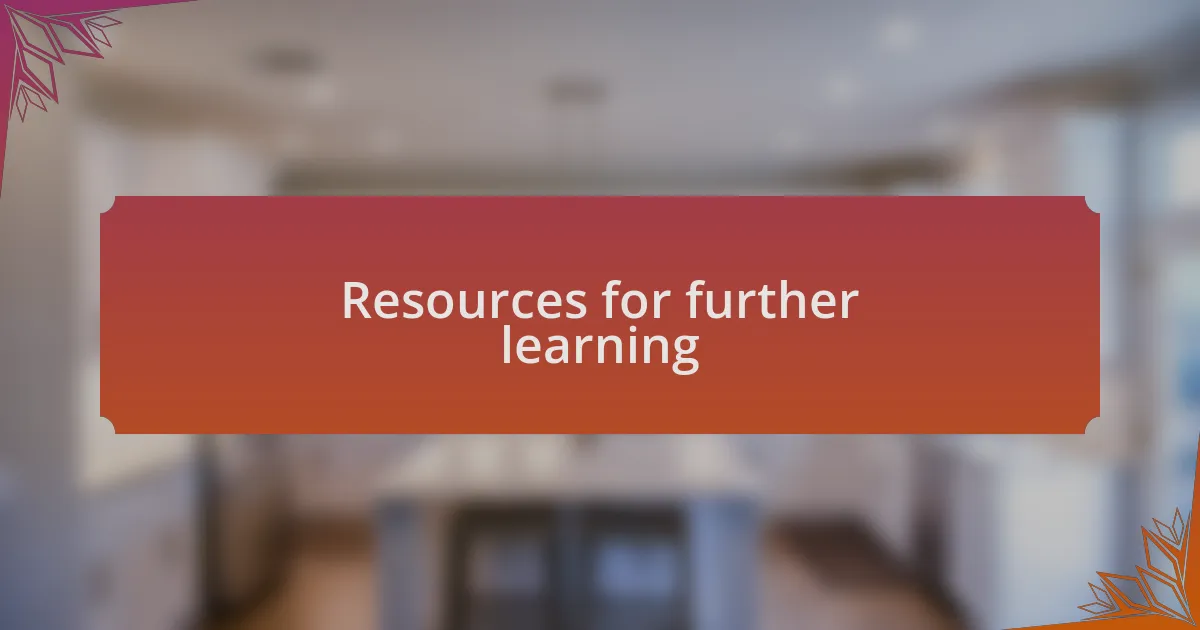
Resources for further learning
When it comes to expanding knowledge on discipline techniques, I often turn to parenting books and online courses. One resource that has significantly impacted my approach is “The Whole-Brain Child” by Daniel J. Siegel and Tina Payne Bryson. This book not only provides deep insights into how children’s brains develop but also offers practical strategies that resonate with my personal experiences of parenting challenges. Have you ever found a book that completely changed your perspective as a parent?
Podcasts have also been an eye-opener for me. I particularly enjoy listening to “Janet Lansbury Unruffled,” where she discusses respectful parenting techniques that align closely with my own philosophy. Hearing real-life scenarios and expert opinions not only validates my feelings but also inspires me to refine my strategy. Do you ever find that listening to someone else’s experiences helps clarify your own parenting beliefs?
Additionally, local parenting workshops or support groups can be incredibly valuable. I recall attending a seminar on positive discipline at my community center, where I was amazed by other parents’ stories and solutions. The camaraderie and shared struggles created a sense of relief and empowerment that I hadn’t anticipated. Have you ever participated in a workshop that left you feeling more connected to your parenting journey?